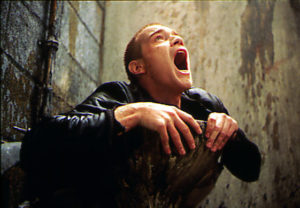There’s something strange about Trainspotting that I’ve never been able to explain. Its story is about Renton (Ewan McGregor before anyone knew who Ewan McGregor was) a drug addict trying to break his habit while his friends disintegrate as they slip deeper into the numb haze of heroin abuse. And yet, despite its depressing plot, Trainspotting is an exhilarating cinematic experience. Somehow through all the muck, filth and deprivation the film inspires its audience to celebrate life. This might lead you to believe that the film glorifies drug abuse; it doesn’t. You’d be hard pressed to find a more devastating storyline than Tommy’s decent into addiction (which runs parallel with Renton’s ascent).
I remember seeing the film for the first time in one of the posh theaters in London’s Leicester Square. I hadn’t seen director Danny Boyle’s debut feature Shallow Grave but the reviews for Trainspotting were excellent so I paid the outrageous ticket price for an evening screening. I wasn’t quite sure of what I was walking into, but with a film like Trainspotting there’s really nothing that can prepare you for what you’re about to see. Following the film I was so enthused that I instantly bought the soundtrack and decided to drop in on one of the dance clubs in Soho rather than heading home to study. The idea of sitting still, when there were so many other ways to celebrate life, seemed like a waste of my cinematic induced adrenaline.
At the time, this was 1996, the only film I could really compare Trainspotting to was Pulp Fiction and while there are similarities between the two you’d never confuse one for the other. Returning to the film for the first time since its 2003 DVD release I’m pleased to find that the film hasn’t lost its edge or its humor. It also seems painfully clear that the film, at least in part, contributed to the international success of Guy Ritchie’s films (beginning with 1998’s Lock, Stock and Two Smoking Barrels) and how its themes are mirrored in Darren Aronofsky’s Requiem for a Dream. The cast is phenomenal. McGregor gets most of the credit but Ewen Bremner, Jonny Lee Miller, Kevin McKidd, Robert Carlyle, Peter Mullan and Kelly Macdonald all deserve a slice of the spotlight. Boyle has of course gone on to establish himself as a phenomenal director with films like 28 Days Later…, 127 Hours, Millions, Sunshine and the Academy Award winning Slumdog Millionaire.
Lionsgate’s Blu-ray release looks wonderful and sounds even better. Despite the film’s limited budget Boyle, along with the help of cinematographer Brian Tufano, were able to create a vivid world bursting with color that looks gorgeous in high definition.
Bonus features mirror the 2003 DVD release, which is a little disappointing but not unexpected. Fortunately the 2003 release included a fantastic audio commentary with Boyle, McGregor, writer John Hodge and producer Andrew Macdonald. There are a handful of throwaway deleted scenes, a retrospective from 2003, a glossy behind-the-scenes featurette, interviews from the film’s showing at Cannes in 1996, a gallery of images and a pair of trailers.
